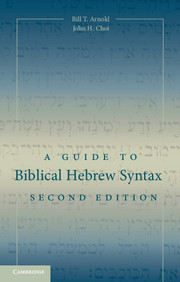Description
A Guide to Biblical Hebrew Syntax (2nd Ed., Revised edition)
Authors: Arnold Bill T., Choi John H.
Introduces basic and critical issues of Hebrew syntax for beginning and intermediate readers of the Hebrew Bible/Old Testament.
Language: English
Subject for A Guide to Biblical Hebrew Syntax:
Publication date: 08-2018
266 p. · 14x21.6 cm · Paperback
266 p. · 14x21.6 cm · Paperback
Description
/li>Contents
/li>Biography
/li>
A Guide to Biblical Hebrew Syntax introduces and abridges the syntactical features of the original language of the Hebrew Bible/Old Testament. An intermediate-level reference grammar for Biblical Hebrew, it assumes an understanding of elementary phonology and morphology, and it defines and illustrates the fundamental syntactical features of Biblical Hebrew that most intermediate-level readers struggle to master. The volume divides Biblical Hebrew syntax and morphology into four parts. The first three cover the individual words (nouns, verbs, and particles) with the goal of helping the reader move from morphological and syntactical observations to meaning and significance. The fourth section moves beyond phrase-level phenomena and considers the larger relationships of clauses and sentences. Since publication of the first edition, research on Biblical Hebrew syntax has substantially evolved. This new edition incorporates these developments through detailed descriptions of grammatical phenomena from a linguistics approach. It retains the labels and terminology used in the first edition to maintain continuity with the majority of entry-level and more advanced grammars.
1. Introduction; 2. Nouns; 3. Verbs; 4. Particles; 5. Clauses and sentences; Appendix I; Appendix II.
Bill T. Arnold is the Paul S. Amos Professor of Old Testament Interpretation at Asbury Theological Seminary, Kentucky. He is the author of Genesis (Cambridge, 2009), and Introduction to the Old Testament (Cambridge, 2014).
John H. Choi (1975–2015) earned degrees from the University of Chicago, Asbury Theological Seminary, Kentucky, and the Ph.D. in Hebraica and Cognate Studies from Hebrew Union College-Jewish Institute of Religion. He authored Traditions at Odds: The Reception of the Pentateuch in Biblical and Second Temple Period Literature (2010).
John H. Choi (1975–2015) earned degrees from the University of Chicago, Asbury Theological Seminary, Kentucky, and the Ph.D. in Hebraica and Cognate Studies from Hebrew Union College-Jewish Institute of Religion. He authored Traditions at Odds: The Reception of the Pentateuch in Biblical and Second Temple Period Literature (2010).
© 2024 LAVOISIER S.A.S.




